|
|
|
Sort Order |
|
|
|
Items / Page
|
|
|
|
|
|
|
| Srl | Item |
| 1 |
ID:
171021
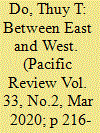

|
|
|
|
|
| Summary/Abstract |
That East Asian IR communities are increasingly interested in knowledge production has become self-evident. While the form that this interest is taken in China is predominantly focused on developing a Chinese School of International Relations Theory (IRT), the situation in Japan is much more diverse and complicated. This article examines the impact of the non-Western IRT movement on Japanese IR academia from a sociology of science perspective. It finds that while indigenous theorizing has garnered interests in a portion of Japanese IR academia due to both internal and external driving forces, there have been few claims for and actual theorizing on a ‘Japanese brand-name’ in IRT like the ‘Chinese School.’ The majority of Japanese IR scholars remain strongly attached to mainstream IRT or the traditional historical and area studies. Such development has its roots in the structural restraints embedded in Japan’s unresolved identity as a de facto polity situated between ‘East and West’ and the heritage of its war-time history. Given these characteristics of IR studies in Japan, the different components of Japanese IR academia will most likely follow their own trajectory without integration and synthesis. This will position Japanese IR, just like its current foreign policy, at a crossroads.
|
|
|
|
|
|
|
|
|
|
|
|
|
|
|
|
| 2 |
ID:
175157
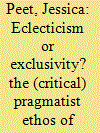

|
|
|
|
|
| Summary/Abstract |
Eclecticism in International Relations (IR) claims to reject the rigid boundaries set by various theoretical traditions, yet, in practice, it falls short of moving the field “beyond paradigms” and tends to produce analytical exclusivity rather than eclecticism. This exclusivity is the result of Sil and Katzenstein’s investment in tenets of American pragmatism. These tenets favor consensus and universalism, leading to the reproduction and exclusivity of the theoretical status quo. Dissolving paradigmatic boundaries requires a more critical form of pragmatism. Drawing on the common origins of feminism and pragmatism paired with the contemporary feminist concept of intersectionality, this essay proposes a critical pragmatist ethos and an intersectional analytic eclecticism. This can produce a more inclusive form of analytic eclecticism and render visible the power dynamics that shape experiences as well as academic scholarship. Only when analytic eclecticism is informed by intersectionality and a critical pragmatism might it actually move IR “beyond paradigms.”
|
|
|
|
|
|
|
|
|
|
|
|
|
|
|
|
| 3 |
ID:
132053
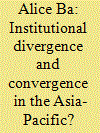

|
|
|
|
|
| Publication |
2014.
|
| Summary/Abstract |
This paper gives attention to the geopolitics related to the Association of Southeast Asian Nations (ASEAN) as an alternative model of regionalism in theory and practice. Offering a rough periodization of ASEAN in IR theory, it considers interacting theoretical and empirical developments, and their geopolitics as one way to think about, first, ASEAN, its defining dynamics and processes of change, and, second, ASEAN's relationship to a larger IR theory literature defined by US preoccupations and the institutional trajectory of the European Union. Three periods are considered: a Cold War period, when ASEAN norms and practices developed relatively insulated from great power expectations and theorizing about ASEAN was minimal; the 1990s, when constructivist theorizing encouraged new thinking about alternative institutional models; and the 2000s, a period characterized by correlating great power pressures and a 'functional' turn in academic and theoretical debates about ASEAN. Special attention is given to the United States as a major, leading actor in both world politics and the institutionalization of international relations as a discipline, as well as the possibilities and constraints of institutional divergence in theory and practice.
|
|
|
|
|
|
|
|
|
|
|
|
|
|
|
|
| 4 |
ID:
101625
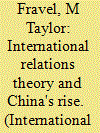

|
|
|
|
|
| Publication |
2010.
|
| Summary/Abstract |
Whether China's rise as a great power will be peaceful or violent is a question that animates scholars and policymakers alike. Power transition theory and offensive realism reach pessimistic conclusions about China's potential for armed conflict because of the benefits of aggression. Nevertheless, applications of these theories to China's rise fail to examine the size and scope of these benefits and to compare them systematically to the costs of conflict that other scholars have identified. To fill this gap, this article applies different international relations theories to identify potential benefits in one defined issue area, territorial conflict, and then weighs these benefits against the likely costs. The potential benefits of territorial expansion are limited, a finding that weakens confidence in the predictions of power transition theory and offensive realism but increases confidence in more optimistic arguments about China's rise based on economic interdependence.
|
|
|
|
|
|
|
|
|
|
|
|
|
|
|
|
| 5 |
ID:
085850
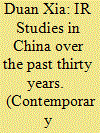

|
|
|
|
|
| Publication |
2009.
|
| Summary/Abstract |
In this paper, the author has systematically summed up the
history and current status of international relation theory studies in
China. The call for build international relation theory with Chinese charateristics is also introduced and analyzed.
|
|
|
|
|
|
|
|
|
|
|
|
|
|
|
|
| 6 |
ID:
089258
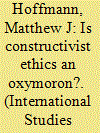

|
|
|
|
|
| Publication |
2009.
|
| Summary/Abstract |
Constructivism is often invoked in calls for a turn toward ethics in the practice of International Relations scholarship. Yet, while constructivists rely on norms and ethical ideas in their explanations of world politics, the theory or approach actually fails spectacularly in providing fundamental notions about what is right or ethical in world politics. In this article I interrogate the paradox that, while constructivists provide a prominent place for morals and ethics in their explanations of world politics, constructivism is agnostic on what those morals and ethics should be. I then inquire into the source of ethics in international relations theory more generally, arguing that the ethical commitments of international relations theories are found in the theories' basic assumptions. Finding a fundamental qualitative difference between constructivism and other international relations theories relative to core assumptions, I discuss what constructivist ethics consists of and I turn inward to reflect on the ramifications of the discussion for personal ethics for a constructivist
|
|
|
|
|
|
|
|
|
|
|
|
|
|
|
|
| 7 |
ID:
102339
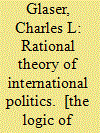

|
|
|
|
|
| Publication |
Princeton, Princeton University Press, 2010.
|
| Description |
xi, 314p.
|
| Standard Number |
9780691143712, hbk
|
|
|
|
|
|
|
|
|
|
|
|
Copies: C:1/I:0,R:0,Q:0
Circulation
| Accession# | Call# | Current Location | Status | Policy | Location |
| 055800 | 327.101/GLA 055800 | Main | On Shelf | General | |
|
|
|
|
| 8 |
ID:
091378
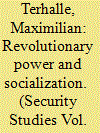

|
|
|
|
|
| Publication |
2009.
|
| Summary/Abstract |
Why do states stay revolutionary for so long? The question of why and how some political players of a country successfully pursue a revisionist strife against the status quo has neither theoretically nor empirically received systematic attention. I use a current policy issue, the crisis regarding Iran, as a single-case study to examine the issue. This article argues that answers are found in the interconnected realms of domestic politics and revolutionary ideas. In Iranian politics specifically, it is both the ideological conservative faction's occupation of key constitutional positions and pursuit of revolutionary ideas, which have caused the recurring and large degree of revolutionary zeal. In turn, this has had a significant effect on the extent of the Islamic Republic's socialization to regional and international politics
|
|
|
|
|
|
|
|
|
|
|
|
|
|
|
|
| 9 |
ID:
101730
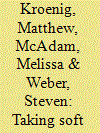

|
|
|
|
|
| Publication |
2010.
|
| Summary/Abstract |
The term soft power is entrenched in the theory and practice of American foreign policy, yet scholars have not yet developed, or empirically tested, a theory about the conditions under which governments can use soft power to their advantage-and that makes good policy hard to design. Drawing on research from the fields of communications, social psychology, and international relations theory, we develop a theory about the conditions under which state efforts to employ soft power will be most likely to succeed. We argue that to apply soft power effectively states must communicate to an intended target in a functioning marketplace of ideas, persuade the target to change its attitude on a relevant political issue, and ensure that the target's newly held attitude influences international political outcomes. We probe the plausibility of our theoretical claims through an examination of U.S. attempts to use soft power in the Iraq War, the war on terror, and democracy promotion. In conclusion, we set forth an agenda for future research on soft power and provide insights for policymakers interested in using soft power as a tool of foreign policy.
|
|
|
|
|
|
|
|
|
|
|
|
|
|
|
|
|
|
|
|
|